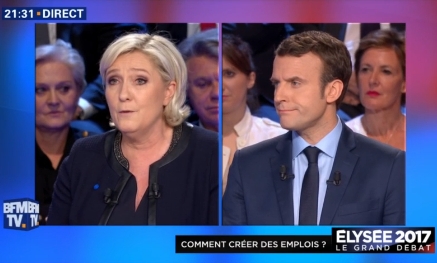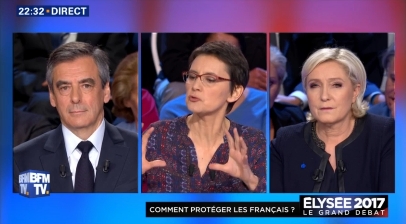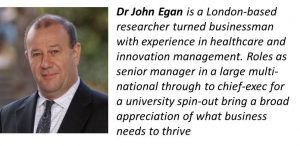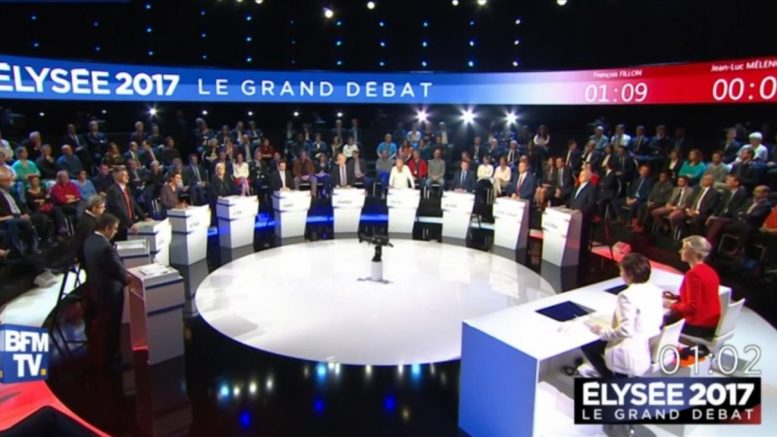With 19 days to go before the first round of the French presidential election, last night a Grand Debat – that lasted almost four hours – was held for all 11 candidates to marshal their arguments and strategies that will see two reach the second round play-off on May 7.
Even with opinion polls needing a good pinch of salt, it seems that only five of these 11 candidates have any chance of reaching the second round. A poll published in Le Monde on the day of the Grand Debat showed the two frontrunners – Emmanuel Macron (centre) and Marine Le Pen (far right) – neck and neck on 25 per cent. They are followed by François Fillon (right) on 17.5 per cent and Jean-Luc Mélenchon and Benoît Hamon, who together split the main left-wing vote with 15 and 10 per cent respectively. The other six candidates together could assemble only 8 per cent of the remaining intentions to vote, but they too had an important part to play.
With unemployment at 9.7 per cent (and more than 23 per cent for those under 25), and with security concerns predominant after a series of appalling terrorist attacks over the past two years, French politics is in a fragile state. These issues centred the debate.
 An unapologetic pro-EU Macron generally retained a presidential composure with a battery of policies to free-up the labour market and encourage an entrepreneurial society based on a mix of fiscal reform, new technology and a respect for citizen’s rights. Marine Le Pen unfurled her protectionnisme intelligent that she considers necessary to project French jobs. For Macron she was proposing, “nationalism, and nationalism is war”.
An unapologetic pro-EU Macron generally retained a presidential composure with a battery of policies to free-up the labour market and encourage an entrepreneurial society based on a mix of fiscal reform, new technology and a respect for citizen’s rights. Marine Le Pen unfurled her protectionnisme intelligent that she considers necessary to project French jobs. For Macron she was proposing, “nationalism, and nationalism is war”.
Le Pen has recently softened her position on Europe to appeal more to the centre-right and disaffected socialist voters. This opened her right flank to attack by François Asselineau who dubs himself “the only true candidate of Frexit” – though with those likely to vote for him sitting at less than 1 per cent, it is unlikely he personally will be following in the footsteps of Brexit.
Fillon was mostly ineffective in defending his territory in the face of Le Pen, partly as his record as a previous prime minister (under President Nicolas Sarkozy) was continually challenged by Gaullist Nicolas Dupont-Aignan in an effort to siphon off some of Fillon’s supporters disillusioned by recent revelations of alleged financial impropriety.
Socialist Mélenchon, a highly charismatic orator, was more successful in repelling the advances of Le Pen by challenging her ambivalence to Europe and laïcité – the separation of church and state that plays such an important role in French politics. It is likely that Mélenchon will see his star rising for a few days following the Grand Debat.
Trotskyist Philippe Poutou, as enfant terrible of the event, was unrelenting in probing into the moral inconsistencies of French political life. He argued that for the self-proclaimed anti-establishment National Front leader Marine Le Pen to claim establishment immunity from prosecution was a paradox that is unavailable to workers facing the same threat. For Le Pen it was a puzzle too.
 The subject of security offered similar opportunities for the contestants to win and lose position in their complex multidimensional political matrix. The claim of Marine Le Pen that France had become a “University of Jihadism” won seemingly unanimous disapproval. Even the thoughtful Benoît Hamon was aghast. However, it was left to Nathalie Arthaud of the far-left Lutte ouvrière party to occupy the moral high ground and point out to those campaigning for tighter control of suspect groups, that the mixing up of immigration, refugees, Muslims and terrorists is falling into a trap set by the terrorist organisations.
The subject of security offered similar opportunities for the contestants to win and lose position in their complex multidimensional political matrix. The claim of Marine Le Pen that France had become a “University of Jihadism” won seemingly unanimous disapproval. Even the thoughtful Benoît Hamon was aghast. However, it was left to Nathalie Arthaud of the far-left Lutte ouvrière party to occupy the moral high ground and point out to those campaigning for tighter control of suspect groups, that the mixing up of immigration, refugees, Muslims and terrorists is falling into a trap set by the terrorist organisations.
In a two-person second round run-off between Macron and Le Pen, the Le Monde poll suggests that Macron would win easily by 61 per cent to 39 per cent for Le Pen. However, there may still be a twist in the tail. A third of voters polled have yet to make up their minds – and this portion increases to 42 per cent for those under the age of 35.
François Fillon is counting on a bolus of support hidden in these undecided voters to push him across the line. If recent history teaches anything, it is that still undecided members of the public are unpredictable. So it is all still to play for.
If the choice were to be based on strictly rational considerations, then Fillon, Macron and Hamon might fill the preferred right-centre-left slots of the political spectrum. Depending on how voter sentiment takes a Brexit-like turn against the established political order then perhaps Le Pen, Macron and Mélenchon may take their place.
In the UK, it seems that the press cannot stop writing about Marine Le Pen. In a recent Buzzfeed survey, in the three months to March, UK news publications produced 602 headlines about Le Pen, four and a half times the number of stories they published about Emmanuel Macron – who is more often portrayed in a negative light.
In France with a pluralist press and a preference for detailed political debate, Macron and the European Union may yet prevail.
Follow on twitter: @johnmegan





